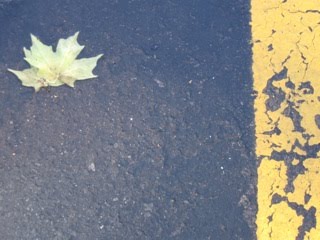"For the warrior, rather than getting away from the constraints of ordinary life, letting go is going further into your life. You understand that your life, as it is, contains the means to unconditionally cheer you up."
- Chogyam Trungpa Rinpoche
Letting go continues to be the theme of my practice. Letting go of my grasping to things as I wish them to be, and all the suffering that story entails. Practicing mindfulness means letting go again and again of our dream of the past and fantasy of the future, coming back to the present moment. Practicing mindfulness means letting go of our agenda to protect and enhance our own little self. It means being aware when we are holding on tight. When we are pushing our own projections onto things as they are. When we are closing up, rather than opening, just a little bit.
This takes practice. We can't just wake up one morning and say, "today, I am going to let go of this false sense of self and all the busy projects it has, and just be present." I mean, we have to start somewhere. Usually, we start by noticing how not letting go creates vast suffering for ourselves and others. How much harder it makes our lives. How much more hassled we feel by ordinary existence. And so yes, at some level, we do decide that we at least need to let go, that we would like to begin to let go, just a little bit. Dip our toes into the waters of things as they really are. But if we don't view letting go as a practice, as a daily, sometimes moment to moment work, then we are setting ourselves up to fail.
So, we need to hold the view that letting go is part of our fundamental practice of mindfulness. We have to set the intention to be aware of what we are up to in our daily lives. And we need to be gentle with ourselves, and hold ourselves in loving kindness when we notice we are hanging on tight. We can have compassion for that very human need to not let go. And if we can, it is helpful to have some form of meditation practice, no matter how brief it is, where we can just sit quietly, even for a few minutes, and work with our minds. Focus on our breath, notice when our mind is not on the breath, and gently bring it back. That is all. Really. The more we do that, the more we can let go of the thoughts that our minds wander off on, and bring it with deliberateness and gentleness back to the breath, the more we can let go in our daily lives when we have everything else going on.
So when, for instance, my18 month old and his three year old brother decide to pull all the new groceries out of their bags, even after being told many times not to, and pour their contents all over my apartment building's hallway, perhaps I won't totally lose my mind. Perhaps, instead of freaking out and feeling totally pissed off, I will be able to let go of being right, let go of my anger, my tiredness, and with firmness, pick them each up, bring them up the stairs to the apartment, sit them down at some crayons, and then go clean up the mess, without engaging in an internal or external tirade. I may, ahem, lose it for a moment, and raise my voice just a touch, or express some frustration, but I won't make an enormous deal over it, or scream or use it as evidence of how hard our daily life is or whatever. The letting go will allow the space for me to cheer up, as Chogyam Trungpa writes, and perhaps, just perhaps, laughter might occur, or at least some softening around what is, after all, just another bit of mess in a rather messy world.
It is so easy to feel overwhelmed and frustrated by the daily chaos of raising children. Any tools to help liberate ourselves from this sense of hassle and overwhelm are precious indeed. Letting go can feel like surrendering to groundlessness. And yes, ultimately, that is what we are doing. Letting go isn't sloppy though - it is occurring within enormous discipline and good heart. We can have confidence that each time we open and let go, we are building our courage, our resilience, our flexibility, and our good hearts. Wishing you all good luck this week in letting go with loving kindness and courage.



